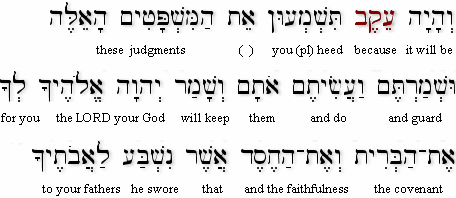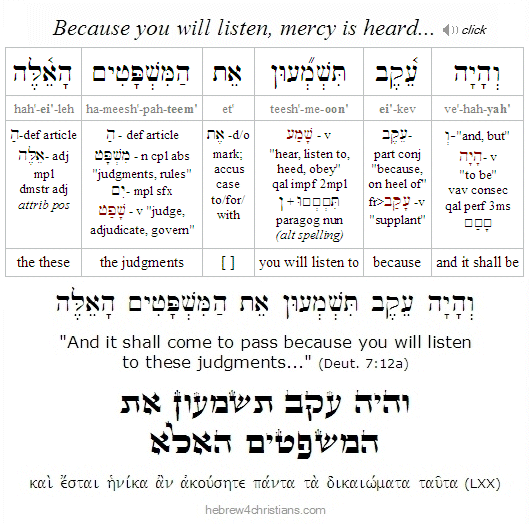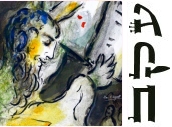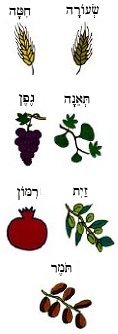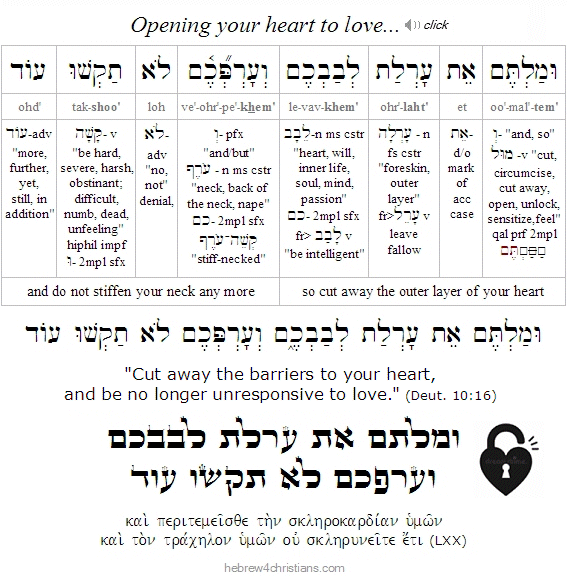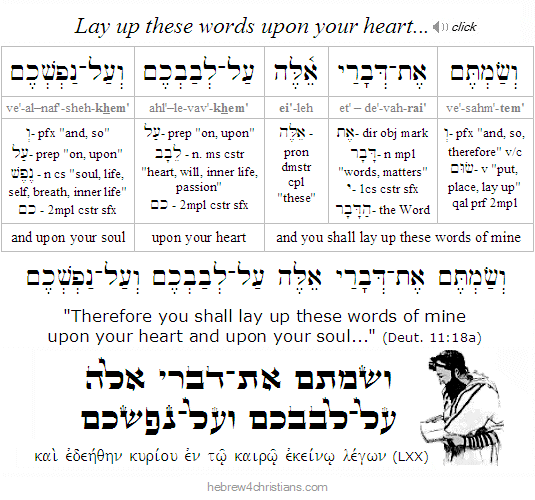|
|
 |
 |
 |
 |
|
Weekly Torah Reading
|
|
|
|
Parashat Eikev ("on the heel of, because")
|
|
|
Click on the links to display the Scriptures:
|
|
|
|
 |
 |
 |
|
Torah Reading Overview
|
|
|
|
In Parashat Eikev, Moses continues his final speech to the Israelites just before they were to enter the Promised Land. It begins: "And it will be (v'haya) because (eikev) you heed these judgments, and guard and do them, the LORD your God will keep with you the covenant and the steadfast love that he swore to your fathers." In other words, as long as the Israelites obey the commandments of the Torah, they will prosper in the land they are about to conquer, just as the LORD promised to their forefathers.
|
|
|
 |
 |
|
Introduction
|
 |
 |
|
Eikev comes from the shoresh akav (עקב, to "take by the heel"), as does the name Ya'akov (Jacob), who had "grabbed the heel" of his twin brother Esau while still in the womb of Rebekah. Ya'akov was later renamed Israel in commemoration of his struggle with Malakh Adonai (the Angel of YHVH) at Peniel. The Lord then declared to him, "Your name shall no longer be Ya'akov ("supplanter") but Yisrael ("Israel"), for as a prince (sar) you have striven (sarita) with God and with men and have prevailed" (Gen. 32:28). The first occurrence of the root appears in Genesis 3:15, where the LORD prophesied that even though the Mashiach's heel (עָקֵב) would be bruised, the very head (rosh) of the nachash (satan) would be crushed. B"H: Yeshua is our Serpent Slayer!
In this parashah, Israel is called to grapple with the mitzvot and to perform them diligently, lest they themselves be supplanted from the land.
The parashah begins with the call to obey (i.e., shema': שָׁמַע) and guard (i.e., shamar: שָׁמַר) the judgments (mishpatim) given in the Torah. As a reward, the LORD will likewise guard (shamar) the covenant (i.e., ha-brit: הַבְּרִית) and love (i.e., chesed: חֶסֶד) that the LORD gave to our fathers, to Abraham, Isaac, and Jacob. Obedience to the commandments will yield blessings: plentiful children, harvests, livestock, and other material blessings in the land. Indeed, the Israelites would be "blessed above all peoples," free of every type of sickness, living in victory in the Promised Land.
But the people were not to live in fear, especially of the seven nations of the land of Canaan. Instead they were to exercise faith, recalling what the LORD did to Pharaoh in Egypt and delivered the people. "So will the LORD your God do to all the peoples of whom you are afraid" (Deut. 7:18). "You shall not be in dread of them, for the LORD your God is in your midst, a great and awesome God."
לא תַעֲרץ מִפְּנֵיהֶם
כִּי־יְהוָה אֱלהֶיךָ בְּקִרְבֶּךָ
אֵל גָּדוֹל וְנוֹרָא
loh ta·a·rohtz · mee·pe·ne·hem
kee-Adonai · e·loh·hey'·kha · be·keer·be·kha
el · gah·dohl · ve·noh·rah

"You shall not be in dread of them,
for the LORD your God is in your midst,
a great and awesome God"
(Deut. 7:21)
|
 |
 |
|
The people were to have no tolerance for idols of any kind. They were to "devote them to utter destruction" (cherem), burning them with fire and eradicating them from the land. The gold and/or silver used for the idols was also not to be used for anything "lest it become a snare" but was to be considered an abomination.
|
 |
 |
|
Remembering God's Care
|
 |
 |
|
Moses continued his speech by reminding the Israelites how the LORD had taken care of them throughout their wandering in the desert. For nearly 40 years, the LORD humbled the people, feeding them with manna and giving them water from the miraculous Rock (1 Cor 10:4). Even the Shechinah glory miraculously kept their clothes fresh. Moses said that the LORD did this in order to teach the people to rely on Him alone to meet all their needs. The hardships there had disciplined them to learn that "man does not live by bread alone, but by everything that proceeds from the mouth of the LORD." Yeshua used this very verse when He "wandered" 40 days and nights in the wilderness, thereby rebuffing the temptations of the devil (Matt. 4:4; Luke 4:4).
|
 |
 |
|
And now the Promised Land lay before the people, a land famous for bikkurim (fruits) referred to as shivat ha-minim, the seven species of crops native to the land of Canaan, namely: wheat, barley, grapes, figs, pomegranates, olives, and dates (or honey made from dates) (Deut. 8:8). As long as the people of Israel would trust in God as evidenced by obeying His voice, He would give them this good land and continue to care for them, just as He did in the desert.
Note that the obligation to bless the LORD after eating comes from the verse, "When you eat and are satisfied, you must bless the Lord your God..." (Deut. 8:10). For this reason, the Birkat Hamazon (grace after meals) is recited after the meal has been eaten. Note also that Rabbinical Judaism has added a host of blessings to recite before eating something (acknowledging our pleasure in the act of eating itself), but unlike the commandment given in the Torah, these blessings are customs or traditions to help sanctify the occasion.
|
|
|
 |
 |
|
However, all this blessedness would come through walking by faith. Moses warned the people not to forget the LORD by ignoring his commandments (mitzvot) and his judgments (mishpatim) and his statutes (chukkim), especially after they had settled the land and become prosperous. If the people forget their supernatural deliverance and origin, turning to idols or believing that their own ingenuity gave them their wealth, they would soon perish from the land, just like the seven Canaanite nations before them.
|
 |
 |
|
The Warning against Pride
|
 |
 |
|
Moses then reminded Israel that they were to be given the land, not because they were better than other nations or more righteous, but because the LORD was using the Israelites as a rod of judgment upon the seven Canaanite nations living there, and because the LORD had earlier promised to give the land to the descendants of Avraham Avinu:
Do not say in your heart, after the LORD your God has thrust them out before you, 'It is because of my righteousness that the LORD has brought me in to possess this land,' whereas it is because of the wickedness of these nations that the LORD is driving them out before you. Not because of your righteousness or the uprightness of your heart are you going in to possess their land, but because of the wickedness of these nations the LORD your God is driving them out from before you, and that he may confirm the word that the LORD swore to your fathers, to Abraham, to Isaac, and to Jacob. Know, therefore, that the LORD your God is not giving you this good land to possess because of your righteousness, for you are a stubborn people.
To make his point, Moses then recounted to the people a list of their recent sins. Even after directly hearing the Voice of the God at Sinai, their fathers provoked the LORD with the Sin of the Golden Calf, disobeying the very Ten Commandments they had promised to keep. Then, upon leaving Sinai (at Taberah), the people complained about the lack of meat. At Massah (also called Meribah) the people complained about the lack of water. At Kivrot-hattaavah they lusted for meat. Finally, while at Kadesh-Barnea, right before they were to take possession of the Promised Land, the people rebelled against the commandment of the LORD and did not believe him (the Sin of the Spies), thus forcing the nation into 40 years of exile. Moses concluded this musar (reproof) with these words: "You have been rebellious against the LORD from the day that I knew you."
|
 |
 |
|
The New Covenant Foreshadowed
|
 |
 |
|
On account the Sin of the Golden Calf, Moses had to intercede on behalf of the people 40 days and nights, to spare them from complete annihilation at the wrath of the LORD.
Some time later, Moses was told to prepare a new set of tablets in order to once again ascend the mountain, where God graciously reinstated the covenant. This second set of tablets was carved from sapphire by Moses himself (instead of by God) as an atonement for Israel's sin with the Golden Calf.
According to Rabbinic tradition, Moses carved the new tablets during the month of Elul, during his second 40 days upon Mt Sinai. According to this tradition, Moses ascended on Rosh Chodesh Elul and descended on the 10th of Tishri, at the end of Yom Kippur, when repentance and restoration of the people was complete. The month of Elul therefore represents the time of national sin and the forgiveness obtained by means of teshuvah (repentance) before the LORD.
It is fascinating to see that this second revelation prefigures the New Covenant that was given to Israel. Just as the first set of tablets, based as they were on the justice and holiness of God, were indeed broken, so a second set was given based on the attributes of God's mercy and grace. Yeshua was broken on behalf of the law but was raised again so that all who trust in Him can truly understand that God is rachum v'chanun, erekh apayim v'rav-chased. For more information, click here.
|
 |
 |
|
Circumcise Your Heart
|
 |
 |
|
In light of all this -- the chesed (covenantal love) of the LORD and His mercy upon Israel, Moses appeals to the people by asking them a rhetorical question: "And now, Israel, what does the LORD your God require of you, but to fear the LORD your God (yirat Adonai), to walk in all his ways, to love him, to serve the LORD your God with all your heart and with all your soul, and to keep the commandments and statutes of the LORD, which I am commanding you today for your good?"
וְעַתָּה יִשְׂרָאֵל מָה יְהוָה אֱלהֶיךָ שׁאֵל מֵעִמָּךְ
כִּי אִם־לְיִרְאָה אֶת־יְהוָה אֱלהֶיךָ לָלֶכֶת
בְּכָל־דְּרָכָיו וּלְאַהֲבָה אתוֹ וְלַעֲבד אֶת־יְהוָה
אֱלהֶיךָ בְּכָל־לְבָבְךָ וּבְכָל־נַפְשֶׁךָ
ve·a·tah yees·rah·el, mah Adonai e·loh·hey'·kha shoh·el me·eem·makh?
kee eem-le·yeer·ah et-Adonai e·loh·hey'·kha lah·le'·chet
be·khol-de·rah·khav ool·a·ha·vah oh·toh, ve·la·a·vohd et-Adonai
e·loh·hey'·kha be·khol-le·vahv·kha oov·khol-naf·she'·kha?

"And now, Israel, what does the LORD your God require of you,
but to fear the LORD your God, to walk in all his ways, to love him,
to serve the LORD your God with all your heart and with all your soul?
The fear of the LORD, yirat Adonai, means practicing the Presence of the LORD at all times in our lives. It is the conscious realization that the LORD sees us and is profoundly concerned with our lives. "There is an eye that sees and an ear that hears, and all our deeds are written in a book" (Avot 2:1). The LORD is the Creator of heaven and earth, and He has set His jealous love upon those who fear Him. Therefore we are called to "circumcise our hearts" -- remove the thickening or hardheartedness -- and be no longer stubborn (or a "stiff-necked people").
According to Rambam (i.e., traditional Rabbinical Judaism), this "circumcision of the heart" means that all desire and greed contained in the heart's foreskin is cut away. One no longer is covetous or lustful, and thus one returns to the time before the sin of the first Adam when doing good was natural, and he had no desire to do the opposite (Rambam, Commentary on The Torah, translated by Rabbi Dr. Charles B. Chavel; Volume 5, p. 341).
|
|
|
 |
 |
|
The Apostle Paul taught that the ritual act of circumcision was meant to be the outward sign of what is invisible, namely, a thorough commitment to God (Rom. 2:28-29). Paul makes the point that you can physically circumcised and not have a circumcised heart, and you can be circumcised in the heart and not physically.
|
|
 |
 |
|
Which is more important to God, the outward show or inward reality? Loving God in the truth is the circumcision of the heart. For more information about this important topic, please see the article, Should Christians be Circumcised?
|
 |
 |
|
Loving the LORD: Shema
|
 |
 |
|
Moses continued by commanding the people to love the LORD and keep all his charge (mishmeret) -- his statutes (chukkim), his rules (mishpatim), and his commandments (mitzvot). He again admonished them to consider the discipline of the LORD (musar) and to remember His saving acts when He rescued the people from bondage in Egypt. Keeping the commandments gives strength to go in and take possession of the Promised Land and to dwell in it securely. Commitment to the LORD's will would ensure successful harvests through the regularity of the autumn and spring rains; but these would be withheld if the people became disobedient.
The parashah concludes with the passage which is used liturgically as the second (of three) portions of the Shema (called the Vehayah). These words (Deut. 11:13-21), reiterating the connection between Israel's devotion to the LORD and their blessing as God's chosen people, are recited twice a day by Orthodox Jews all over the world.
|
 |
|
|
 |
 |
 |
|
Haftarah Reading Overview
|
 |
 |
|
The Haftarah for Parashat Eikev (Isaiah 49:14-51:3) is called the "Second Haftarah of Consolation," which begins with a lament from Zion, the City of Jerusalem: "The LORD has forsaken me; my Lord has forgotten me." Click the graphic to learn the Hebrew:
 |
The LORD responds with a beautiful metaphor of His love for Israel. Even if the unconditional love a mother has for her child should somehow fail, God's love for the Jewish people would not. No, the LORD has "engraved Jerusalem upon His palms" (a midrash states that the LORD wears tefillin with promises to Israel inscribed upon them), and one day Jerusalem will be restored to its originally intended glory.
Despite the calamity of the exile and the destruction of the Temple, Jerusalem will be rebuilt and overflowing with Jewish people. In that day, the nations will "carry the sons and daughters" of Israel upon their shoulders and give homage to the Jewish people. If those nations refuse this homage, the LORD will vanquish them and make them "drunk with their own blood." All the world will know that the LORD is the redeemer and Savior of Israel: the Mighty One of Ya'akov.
In chapter 50, the LORD responds again to charge of abandonment. Where is the "get" or divorce document? The divorce (mentioned in Jeremiah 3:8) was initiated on account of the sins of the Jewish people; but should they repent, the decree will be null and void.
The remainder of the haftarah is prophetic of the Mashiach Yeshua, who "gave his back to those who strike, his cheeks to those who pull out the beard; and did not hide his face from disgrace and spitting" and "set his face like flint" in order to be the Redeemer of Israel.
מִי בָכֶם יְרֵא יְהוָה שׁמֵעַ בְּקוֹל עַבְדּוֹ
אֲשֶׁר הָלַךְ חֲשֵׁכִים וְאֵין נגַהּ לוֹ
יִבְטַח בְּשֵׁם יְהוָה וְיִשָּׁעֵן בֵּאלהָיו
mee · vah·khem · ye·rei · Adonai · shoh·me'·a · be·kohl · av·doh
a·sher hah·lakh cha·she·khim ve·ein noh·gah loh
yeev·tach be·shem Adonai ve·yee·shah·ein be·loh·hahv

"Who among you fears the LORD and obeys the voice of his servant?
Let him who walks in darkness and has no light
trust in the name of the LORD and rely on his God."
(Isaiah 50:10)

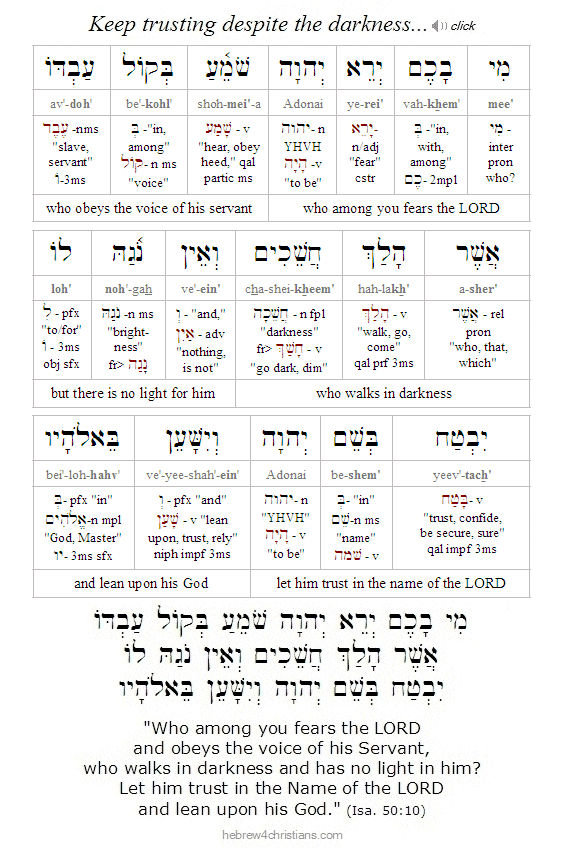
Israel is then told to remember Abraham and Sarah, the original parents of the Jewish people. Just as they had given up hope of having a child - and yet miraculously were given Isaac as the child of promise - so the exiled people of Israel should keep hope that one day the redemption of Israel would be fulfilled. In the end, the LORD Yeshua the Mashiach will indeed comfort Israel, blessed be He.
|
 |
 |
|
 |
 |
|
 |
|
|
|
Brit Chadashah Overview
|
|
|
|
The reading from the book of Hebrews is linked to the Haftarah. Just as Abraham is described as "looking forward to the city that has foundations, whose designer and builder is God," and Sarah is described as conceiving Isaac through faith, so we too, as followers of the Mashiach Yeshua, are ger v'toshav - strangers and sojourners upon the earth - eagerly anticipating the revelation of the LORD at the end of days. We, too, await the future glory of Jerusalem, when the LORD Jesus will reign as the King of Israel during the millennial kingdom, and all the promises given to national Israel are fulfilled.
The passage from Romans 8 is a triumphant paean of confidence in the LORD to fulfill His word and keep His promises. Nothing in all of hell, earth, or heaven can separate us from the love and purposes of the LORD, who works all things together for good to those who are called out to be His own am segulah (treasured people). May His great Name be praised forever and ever.
Blessing:
|
 |
|
|
 |
|
|
 |
 |
|
Related Discussion:
|
|
|
|
 |
 |
|
Hebrew Audio Files:
|
|
 |
 |
|
Click the following links to hear the desired chapters read from this week's Torah:
|
|


